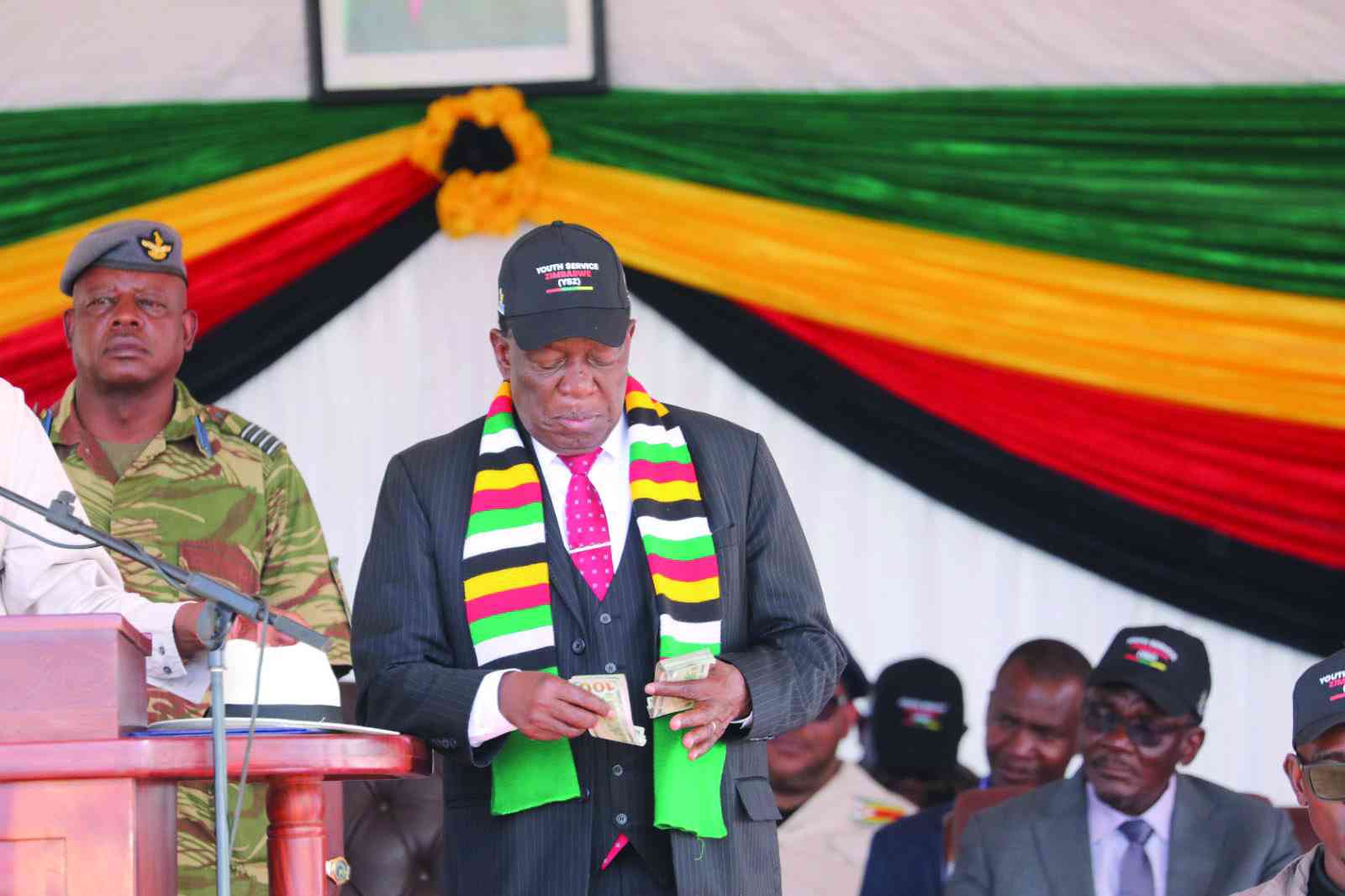
Last week, President Emmerson Mnangagwa was spotted counting United States dollars at Nhakiwa Vocational Training Centre in Uzumba, where he was launching the rebranded Youth Service in Zimbabwe Programme, raising questions about his commitment to the new local currency.
This incident came just a month after the launch of the Zimbabwe Gold (ZiG) currency, which was touted as a solution to the country's economic woes.
We are talking about a man who is about to end his second term and already he has introduced two local currencies, the RTGs, and now the ZiG.
The irony of the situation is palpable. A leader who champions a new local currency is seen counting foreign currency, exposing a glaring disconnect between words and actions.
During his passionate speech urging youths to embrace the country’s newly introduced local currency, Mnangagwa was seen digging into his black suit pockets and pulling out a thick wad of US$100 notes to hand Lands and Agriculture minister Anxious Masuka US$500.
Mnangagwa's act of publicly handling US dollars sends a confusing message. It suggests a lack of faith in the currency his administration is promoting.
Citizens are understandably sceptical when the leader championing a new currency is seen using another. It raises questions about the government's commitment to monetary policies.
The continued display of US dollars by some leaders can discourage businesses and consumers to embrace ZiG. If the president himself does not trust the local currency for basic transactions, how can the general population do so?
- NoViolet Bulawayo’s new novel is an instant Zimbabwean classic
- Jah Prayzah, Zanu PF rekindles ‘lost love’
- Bank workers appeal to Ncube for tax relief
- Indosakusa marks 21-year anniversary milestone
Keep Reading
Such hypocrisy erodes public confidence in leadership. People feel misled and taken for granted. This cynicism can lead to disengagement from civic processes and a decline in overall morale.
The launch of the ZiG dollar was hailed as a bold move towards economic independence and self-sufficiency.
However, Mnangagwa's actions at the youth league event suggest that even he doesn't have faith in the new currency. This raises questions about the government's commitment to its own economic policies and the sincerity of its leaders.
The crisis of credibility is not unique to Zimbabwe or Mnangagwa. Leaders around the world have been accused of hypocrisy and double standards, damaging their credibility and that of their institutions.
The consequences are severe - citizens become disillusioned, trust in government and institutions plummets, and social unrest and disengagement follow.
Leaders must recognise that credibility is built on actions, not words. When they fail to practice what they preach, they create a chasm between their rhetoric and reality. This gap undermines trust and creates a culture of dishonesty, where truth is relative and integrity is optional.
Restoring credibility requires leaders to acknowledge their own shortcomings and take concrete steps to address them. This includes demonstrating transparency, accountability, and a commitment to ethical leadership.
In Zimbabwe's case, Mnangagwa must demonstrate his faith in the ZiG dollar by using it himself and ensuring that his government prioritizes its use.
Beyond the dollars
The issue goes beyond the specific instance of the US dollars. It's about a broader pattern of leaders advocating policies they themselves don't adhere to.
Austerity Measures: Politicians may promote belt-tightening for the public while living lavish lifestyles. This disconnect exposes a lack of shared sacrifice and fuels resentment.
Environmental Policies: Leaders who champion environmental causes yet fly on private jets or vacation in ecologically sensitive areas undermine their message. It raises questions about their genuine commitment to sustainability.
Ethical Conduct: Leaders caught in corruption scandals or displaying questionable behavior severely damage their credibility. Preaching high moral standards while engaging in unethical practices creates a chasm between words and actions.
The consequences of dissonance
The ramifications of a credibility crisis are far-reaching.
When leaders lack public trust, their policies are less likely to be implemented effectively. People are less inclined to cooperate if they don't believe in the leadership or the message.
Disillusionment with leadership can exacerbate existing social and economic inequalities. It fuels a sense of powerlessness and fuels resentment towards those in authority.
A decline in trust in leadership weakens democratic institutions. People become disengaged from the political process, leading to lower voter turnout and a sense of apathy.
Restoring Trust: The path forward
Leaders can rebuild trust by demonstrably aligning their actions with their words. Here's what they can do:
Leaders must set the standard for the behaviour they expect from others. This means embracing the policies they advocate for and demonstrating a commitment to shared sacrifice.
Open communication and a willingness to be held accountable are crucial. Leaders need to explain their decisions, acknowledge mistakes, and be receptive to feedback.
Following through on commitments is vital. When leaders deliver on their promises, it demonstrates their seriousness and builds public confidence.
The case of Zimbabwe
In Zimbabwe's case, rebuilding trust requires a multi-pronged approach. The government must demonstrate its commitment to the ZiG. This can be done through:
Policies that encourage businesses to price goods and services in ZiG, coupled with measures to combat inflation, can create a demand for the local currency.
Investing in infrastructure that facilitates domestic trade and reduces reliance on imported goods strengthens the ZiG's role in the economy.
A comprehensive public education campaign can explain the benefits of using the ZiG and promote its acceptance within the population.
*Gary Gerald Mtombeni is a journalist based in Harare. He writes here in his own personal capacity. For feedback Email [email protected]/ call- +263778861608







